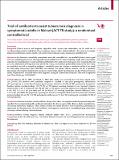Files in this item
Trial-of-antibiotics to assist tuberculosis diagnosis in symptomatic adults in Malawi (ACT-TB study) : a randomised controlled trial
Item metadata
| dc.contributor.author | Divala, Titus H | |
| dc.contributor.author | Corbett, Elizabeth L | |
| dc.contributor.author | Kandulu, Chikondi | |
| dc.contributor.author | Moyo, Brewster | |
| dc.contributor.author | MacPherson, Peter | |
| dc.contributor.author | Nliwasa, Marriott | |
| dc.contributor.author | French, Neil | |
| dc.contributor.author | Sloan, Derek J | |
| dc.contributor.author | Chiume, Lingstone | |
| dc.contributor.author | Ndaferankhande, Masiye John | |
| dc.contributor.author | Chilanga, Sanderson | |
| dc.contributor.author | Majiga, Sabina Tazirwa | |
| dc.contributor.author | Odland, Jon Øyvind | |
| dc.contributor.author | Fielding, Katherine L | |
| dc.date.accessioned | 2023-04-03T15:30:06Z | |
| dc.date.available | 2023-04-03T15:30:06Z | |
| dc.date.issued | 2023-04-01 | |
| dc.identifier | 283809039 | |
| dc.identifier | a98d8bf7-8553-4914-b713-408842d8db89 | |
| dc.identifier | 36925176 | |
| dc.identifier | 85150181364 | |
| dc.identifier.citation | Divala , T H , Corbett , E L , Kandulu , C , Moyo , B , MacPherson , P , Nliwasa , M , French , N , Sloan , D J , Chiume , L , Ndaferankhande , M J , Chilanga , S , Majiga , S T , Odland , J Ø & Fielding , K L 2023 , ' Trial-of-antibiotics to assist tuberculosis diagnosis in symptomatic adults in Malawi (ACT-TB study) : a randomised controlled trial ' , The Lancet Global Health , vol. 11 , no. 4 , pp. e556-e565 . https://doi.org/10.1016/S2214-109X(23)00052-9 | en |
| dc.identifier.issn | 2214-109X | |
| dc.identifier.other | RIS: urn:7FCEE00C9AB4C07804011AC8062D0F9A | |
| dc.identifier.other | ORCID: /0000-0002-7888-5449/work/131588763 | |
| dc.identifier.other | pmcid: PMC10030459 | |
| dc.identifier.uri | https://hdl.handle.net/10023/27323 | |
| dc.description | Funding: THD is funded by the Commonwealth Scholarship Commission and the Northern Norway Regional Health Authority (Helse Nord RHF). This trial is part of his PhD work at London School of Hygiene & Tropical Medicine. ELC is funded by a Wellcome Trust Senior Research Fellowship in Clinical Science (WT200901) that supported the tuberculosis laboratory work. KLF received funds from the UK Medical Research Council (MRC), the UK Department for International Development (DFID) under the MRC and DFID Concordat agreement, and the MRC Tropical Epidemiology Group (MR/K012126/1). PM is funded by Wellcome (206575/Z/17/Z). | en |
| dc.description.abstract | Background Clinical practice and diagnostic algorithms often assume that tuberculosis can be ruled out in mycobacteriology-negative individuals whose symptoms improve with a trial-of-antibiotics. We aimed to investigate diagnostic performance, clinical benefit, and antimicrobial resistance using a randomised controlled trial. Methods In this three-arm, individually randomised, open-label, controlled trial, we enrolled Malawian adults (aged ≥18 years) attending primary care who reported being unwell for at least 14 days (including cough) with no immediate indication for hospitalisation at Limbe and Ndirande Health Centres in Blantyre. Participants were randomly allocated (1:1:1) to azithromycin (500 mg taken once per day for 3 days), amoxicillin (1 g taken three times per day for 5 days), or standard of care with no immediate antibiotics, stratified by study site. Sputum at enrolment and day 8 was tested for tuberculosis (microscopy, Xpert MTB/RIF, and culture). The primary efficacy outcome was day 8 specificity (percentage with symptom improvement among mycobacteriology-negative participants), and day 29 clinical outcome (death, hospitalisation, or missed tuberculosis diagnosis) among all randomised participants. This study is registered with ClinicalTrials.gov, NCT03545373. Findings Between Feb 25, 2019, and March 14, 2020, 5825 adults were screened and 1583 (mean age 36 years; 236 [14·9%] HIV positive) were randomly assigned to standard of care (530 participants), azithromycin (527 participants), or amoxicillin (526 participants) groups. Overall, 6·3% (100 of 1583 participants) had positive baseline sputum mycobacteriology. 310 (79·1%) of 392 patients receiving standard of care reported symptom improvement at day 8, compared with 340 (88·7%) of 383 patients receiving azithromycin (adjusted difference 8·6%, 95% CI 3·9–13·3%; p<0·0004) and 346 (89·4%) of 387 receiving amoxicillin (adjusted difference 8·8%, 4·0–13·6%; p=0·0003). The proportion of participants with day 29 composite clinical outcomes was similar between groups (standard of care 1% [7 of 530 participants], azithromycin 1% [6 of 527 participants], amoxicillin 2% [12 of 526 participants]). Interpretation Routine outpatient trial-of-antibiotics during tuberculosis investigations modestly improved diagnostic specificity for mycobacteriologically confirmed tuberculosis but had no appreciable effect on death, hospitalisation, and missed tuberculosis diagnosis. These results confirm the limited benefit of trial-of-antibiotics, presenting an opportunity for discontinuation of trial-of-antibiotics and improved antimicrobial stewardship during tuberculosis screening, without affecting clinical outcomes. | |
| dc.format.extent | 10 | |
| dc.format.extent | 410843 | |
| dc.language.iso | eng | |
| dc.relation.ispartof | The Lancet Global Health | en |
| dc.subject | RA0421 Public health. Hygiene. Preventive Medicine | en |
| dc.subject | 3rd-DAS | en |
| dc.subject | SDG 3 - Good Health and Well-being | en |
| dc.subject | AC | en |
| dc.subject | MCC | en |
| dc.subject.lcc | RA0421 | en |
| dc.title | Trial-of-antibiotics to assist tuberculosis diagnosis in symptomatic adults in Malawi (ACT-TB study) : a randomised controlled trial | en |
| dc.type | Journal article | en |
| dc.contributor.institution | University of St Andrews. School of Medicine | en |
| dc.contributor.institution | University of St Andrews. Infection and Global Health Division | en |
| dc.identifier.doi | 10.1016/S2214-109X(23)00052-9 | |
| dc.description.status | Peer reviewed | en |
This item appears in the following Collection(s)
Items in the St Andrews Research Repository are protected by copyright, with all rights reserved, unless otherwise indicated.

